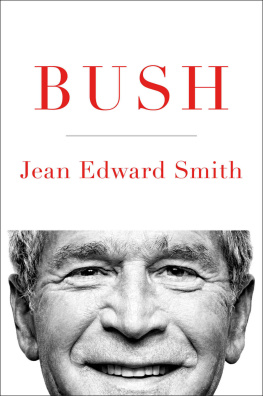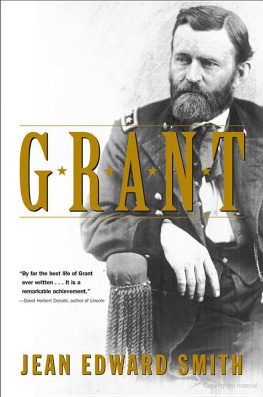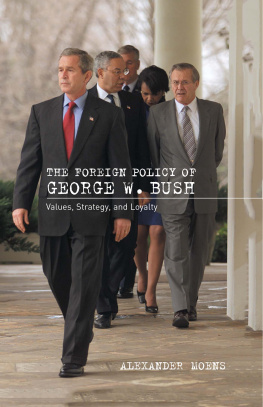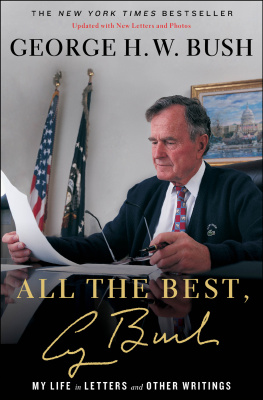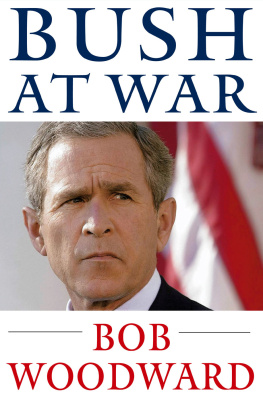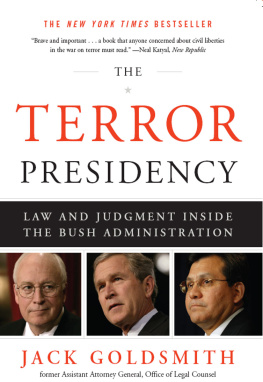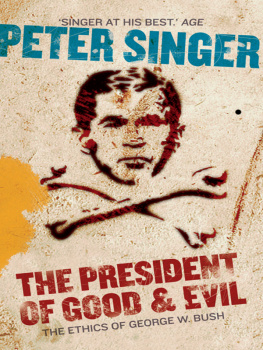Thank you for downloading this Simon & Schuster eBook.
Join our mailing list and get updates on new releases, deals, bonus content and other great books from Simon & Schuster.
C LICK H ERE T O S IGN U P
or visit us online to sign up at
eBookNews.SimonandSchuster.com
Contents
To John and Sandy
friends... colleagues... mentors
Theres not going to be any question about whos in charge. Decisions are going to come to my desk, and Im going to be the one making them. I am THE DECIDER.
GEORGE W. BUSH
Preface
R arely in the history of the United States has the nation been so ill-served as during the presidency of George W. Bush. When Bush took office in 2001, the federal budget ran a surplus, the national debt stood at a generational low of 56 percent of gross domestic product (GDP), and unemployment clocked in at 4 percentwhich most economists consider the practical equivalent of full employment. The governments tax revenue amounted to $2.1 trillion annually, of which $1 trillion came from personal income taxes and another $200 billion from corporate taxes. Military spending totaled $350 billion, or 3 percent of GDPa low not seen since the late 1940sand not one American had been killed in combat in almost a decade. Each dollar bought 1.06 euros, or 117 yen. Gasoline cost $1.50 per gallon. Twelve years after the Berlin Wall came down, the United States stood at the pinnacle of authority: the worlds only superpower, endowed with democratic legitimacy, the credible champion of the rule of law, the exemplar of freedom and prosperity.
Eight years later the United States found itself in two distant wars of choice; military spending constituted 20 percent of all federal outlays and more than 5 percent of the gross domestic product. The final Bush budget was $1.4 trillion in the red and the national debt was out of control. The nations GDP had increased from $10.3 trillion to $ The United States remained the worlds only superpower, but its reputation abroad was badly tarnished.
Was Bush responsible? Perhaps not for the housing bubble or the disastrous collapse of high-risk investments in derivatives, except that he equated the American dream with home ownership and loosened oversight of the securities industry. Otherwise the answer is a resounding yes. Unprepared for the complexities of governing, with little executive experience and a glaring deficit in his attention span, untutored, untraveled, and unversed in the ways of the world, Bush thrived on making a show of his decisiveness. Im not afraid to make decisions, he told a biographer. Matter of fact, I like this aspect of the presidency. But his greatest strength became his worst flaw. His self-confidence and decisiveness caused him to do far more damage than a less assertive president would have.
The critical turning point came on September 12, 2001. Al Qaedas attacks on the United States on 9/11 violated the universal norms of civilized society, and the immediate global outpouring of empathy for the U.S. was unparalleled. Accordingly, September 12 was a defining moment in American history: the United States was not only an economic powerhouse and a military superpower but also enjoyed unprecedented moral authority. Bush could have capitalized on that support but instead he squandered it. He strutted around like a cowboy and then picked a fight with Iraq.
By conflating the events of 9/11 and Saddam Hussein, Bush precipitated the deterioration of Americas position abroad, led the United States into a $3 trillion war in Iraq that cost more than four thousand American lives and an unwinnable conflict in Afghanistan, promulgated an egregious doctrine of preventive war, alienated Americas If Saddam and his secular regime had remained in power, the so-called Islamic State of Iraq could not have been created and the ISIS we know today would not exist. Domestically, the hysteria unleashed by his administration undermined civil liberty, eroded the rule of law, and tarnished respect for traditional values of tolerance and moderation.
I am the war president, Bush once boasted, asserting sophomoric delight in military braggadocio. George W. Bush had lived in his fathers shadow all of his life: at Andover and Yale, in the oil business, and in politics. To crush Saddam Hussein, which George Herbert Walker Bush had declined to do, would afford him the rare opportunity to succeed where his father had failed.
George W. Bushs legacy was a nation impoverished by debt, besieged by doubt, struggling with the aftereffects of the worst recession since the Great Depression, and deeply engaged in military conflicts of our own choosing. His tin ear for traditional conservative values, his sanctimonious religiosity, his support for Guantnamo, CIA renditions, and government snooping have eroded public trust in the United States at home and abroad. For eight years Bush made the decisions that put the United States on a collision course with reality. To argue that by taking the actions that he did, the president kept America safe is meretricious: the type of post hoc ergo propter hoc analysis that could justify any action, regardless of its impropriety. The fact is, the threat of terrorism that confronts the United States is in many respects a direct result of Bushs decision to invade Iraq in 2003.
Bush was the decider. But he did not wrestle with the details of policy, particularly foreign policy. By contrast, FDR and Eisenhower determined every nuance of Americas global stance. Roosevelt had no foreign policy adviser. Harry Hopkins was the presidents personal emissary with foreign leaders, and Secretary of State Cordell Hull was relegated to diplomatic housekeeping. Under Eisenhower, the director of the NSC staff was merely an assistant to the president, not the national security adviser, and Ike always kept Secretary of State John Foster Dulles on a short leash.
Bush took a different view of the chain of command. Not since the days of Warren Harding, Calvin Coolidge, and Herbert Hooverthe Republican hands-off-the-ship-of-state trinity of the 1920shad a president been so detached from the detailed, day-to-day determination of policy alternatives. Bush saw issues in terms of black and white. There were no subtleties and no shades of gray. The war in Iraq was a biblical struggle of good versus evilsomething from the pages of the Book of Revelation. His decision to bring democracy to Iraq was equally arbitrary and unilateral. Bushs religious fundamentalism often obscured reality. And he expected his cabinet to fall into line, not debate possible alternatives.
Bush was supported by a phalanx of subcabinet appointees, conservative in outlook, crisply articulate, and powerfully motivated to provide the intellectual justification for policies the president had decided upon: men like I. Lewis Scooter Libby, Paul Wolfowitz, Elliott Abrams, and Douglas Feith. Never before in American history has an administration come to power with a subcabinet echelon of like-minded ideologues, friends over the decades, dedicated to a common purpose, and armed with a game plan ready to be implemented. All had served in the administration of George H. W. Bush, and during the Clinton years formed a veritable government in exile. Their seminal policy statement had been drafted in 1991 by Wolfowitz and Libby, then serving as Secretary Dick Cheneys deputies in the Department of Defense, calling for American military superiority, emphasizing the power of the president to act unilaterally when international reaction proves sluggish, and advocating preemptive attack against rogue states seeking to acquire weapons of mass destruction.
In 1997, they, along with Cheney and Donald Rumsfeld, founded the Project for the New American Century, dedicated to increasing defense spending, challenging regimes hostile to U.S. interests and values, and explicitly advocating regime change in Iraq. Had it not been for 9/11, their manifesto would have been little more than a footnote in
Next page
